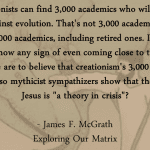When I shared yesterday’s blog post on Facebook, I added some words, which I want to also share here, to provide further opportunity for discussion and input from blog readers. I already had the post scheduled for yesterday, based on conversation about the Gospel of John in my Sunday school class last weekend. There is no way to talk about the imagery in the Gospel of John, the timing of the crucifixion, and other related matters without talking about Passover. And yet last night in church, as the choir sang a song with the title “The True Passover Lamb,” I found myself thinking about this imagery from a different perspective. First, here’s the song:
We live in an era in which white supremacists march in the streets chanting that Jews “will not replace us.” And yet historically it has been white Christians who have been saying theologically “we will replace you,” with the theology at times providing justification for mistreatment and even attempted genocide. Where does that leave this language, woven into the Christian tradition in its earliest texts, when considered in this context of ours today? Most religions have claimed to replace and improve upon some other, usually while owing an incredible amount to that earlier tradition, and in most cases having emerged directly from it. I disagree with Muslims who claim that the Paraclete predicted in the Gospel of John was the prophet Muhammad. But despite its co-opting of texts in my own tradition, I would not go so far as to suggest that they don’t have the right to hold this view. And so as a religion professor situated in the liberal Christian tradition, I find myself thinking about these kinds of things when others would simply be enjoying the music.
I know that, in one sense, ultimately my own responsibilities are (1) how I express my own faith, (2) what I teach in my classes, and (3) what I advocate for in communities that I am part of. But that somehow doesn’t seem adequate as I share a blog post I wrote, with echoes of a Christian song with supersessionist lyrics and a style that emulates Jewish musical traditions still in my head, in an era in which antisemitism is on the rise.
I added subsequently in a comment:
I was afraid when I posted this that, in addition to still alienating Jews I would also offend Christians, and Muslims, and most of all hurt the feelings of my pastor, our choir director, and the choir! 🙂
Ultimately, my inclination is to strive to be the sort of Christian and the sort of individual who stands so clearly for social justice, inclusion, welcome, equality, freedom of religion and of speech, and mutual understanding, that it more than counters any ongoing negative impact there could potentially be from these elements of the Christian tradition. After all, the Gospel of John is a Jewish text, not an anti-Jewish one, and to the key issue is not how this Jewish group sought to interpret their tradition, but what Gentile Christians did with that language subsequently.
My acknowledgment that Jewish friends, hearing the words of the song, might have felt profoundly uncomfortable, is part of my effort in this direction. But more than that, I’d like to reclaim Jesus and his earlier followers as Jewish advocates for inclusivity and breaking down barriers, so that even language like that in the song is understood not as an attack but as a bridge, not as an attempt to exclude but as an invitation to collaborate.
What are your thoughts on this? Thank you for the opportunity to share my experiences and things that I think about and wrestle with, and participate in a wider conversation about them!
Of related interest, Indianapolis JCRC shared some materials for Passover that provide an illustration of some of the ways that it is possible to give expression to a specific faith tradition in a manner that is also supportive of others. See also the array of Passover-related music shared by the Milken Archive.













